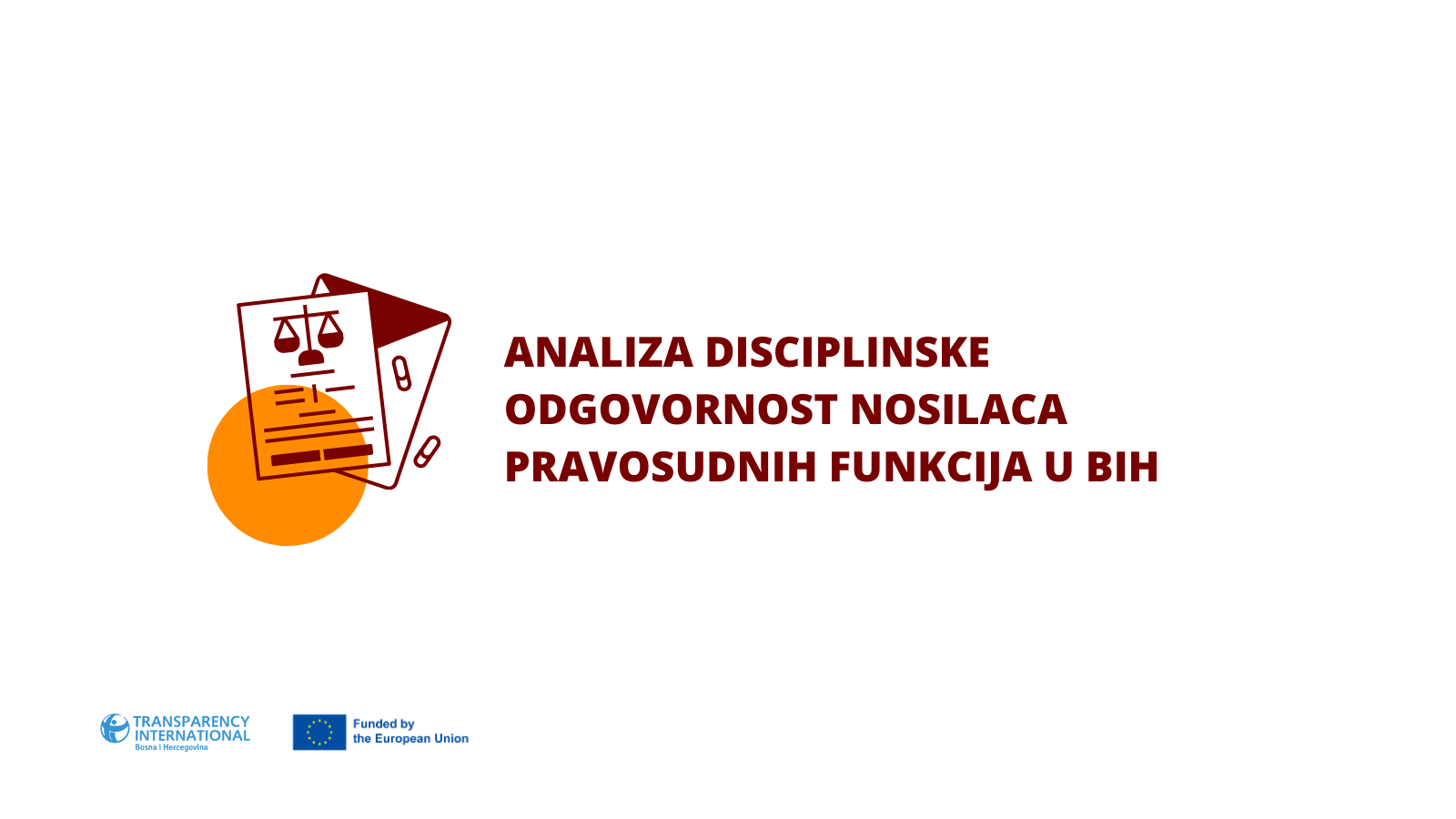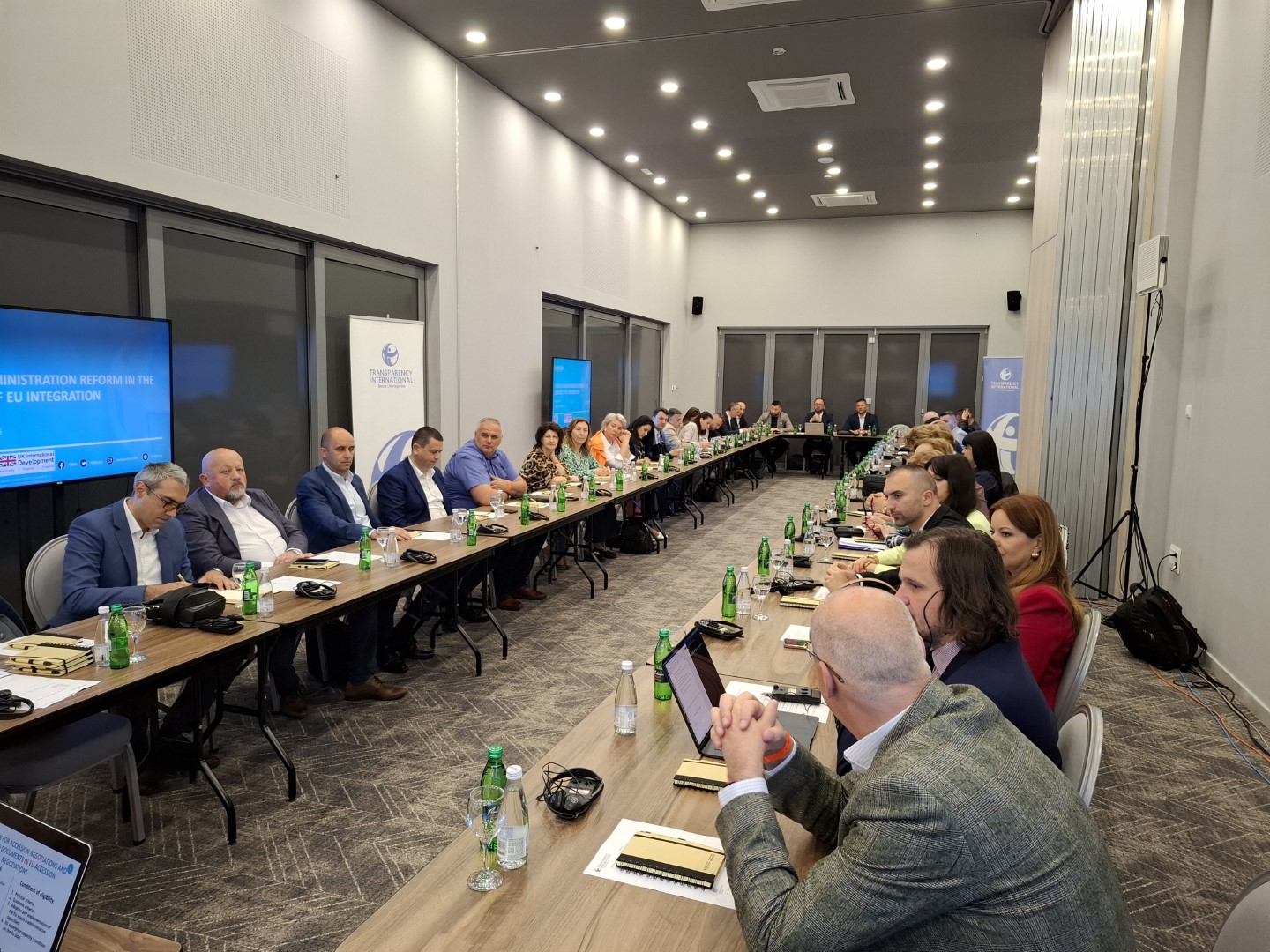Analysis of Disciplinary Responsibility of Judges and Prosecutors: Salary Reduction the Most Common Punishment
Despite the fact that a greater number of disciplinary measures was imposed against judges and prosecutors, who made mistakes in their work during 2022 compared to the year...

Despite the fact that a greater number of disciplinary measures was imposed against judges and prosecutors, who made mistakes in their work during 2022 compared to the year before, in Bosnia and Herzegovina, most of them were punished with a salary reduction and only two prosecutors were moved to a lower position due to negligence in their work.
These are the chief prosecutors of the Cantonal Prosecutor’s Office of the Bosnian-Podrinje Canton and the Public Prosecutor’s Office of the Republic of Srpska, Mirsad Bilajac and Mahmut Švraka, who were punished by being transferred to the position of prosecutor because they bypassed the TCMS automatic case assignment system. These are at the same time the harshest punishments imposed against the holders of judicial functions in 2022.
The majority of sentences imposed against judges and prosecutors in Bosnia and Herzegovina in the past year, 70% of them, are salary reductions, and it is important to emphasize that, according to the Law on the High Judicial and Prosecutorial Council, the sentence for a judge or prosecutor can be reduced by up to 50% and for a period of up to one year, however, data on how much the salary was reduced are not available to the public, and the decision on the amount of the salary reduction depends entirely on the assessment of the HJPC or the commission that decides on a particular case.
Based on the monitoring of 33 disciplinary proceedings and the data provided by the HJPC, an Analysis of the Disciplinary Responsibility of Holders of Judicial Offices in BiH was prepared, showing that the mechanisms for ensuring the disciplinary responsibility of holders of judicial offices are insufficiently transparent, complicated and long-lasting.

In addition to salary reductions and transfers, four written warnings were issued in 2022, that were not made public, and the same number of public warnings for work failures. The above indicates that the method of punishment for observed disciplinary violations of judges and prosecutors is relatively mild and ineffective, taking into account the level of responsibility that these functions carry with them and the general situation in the judiciary.

In 2022, a greater number of cases where the determination of disciplinary responsibility was suspended was observed, and the occurrence of abuse of procedures in order to delay the procedure until the conditions for its termination are met, is of particular concern. Thus, the proceedings against Jadranko Grčević, the former president of the Basic Court in Brčko District, who did not withdraw from the case in which there was a conflict of interest, was postponed several times with intervals of up to three months until Grčević retired, after which the proceedings were suspended and no disciplinary measure was imposed on him.
A special problem when determining disciplinary responsibility of judges and prosecutors in Bosnia and Herzegovina is a complex procedure, i.e. the possibility of filing an appeal several times after the first-instance authority has made a decision. Namely, in addition to the First Instance and Second Instance Disciplinary Commissions, it is possible to file an appeal with the Supreme Court of Justice as the third level in the procedure, and a judge or prosecutor who has been relieved of duty can ultimately present the appeal before the Court of Bosnia and Herzegovina, which represents the fourth level of the procedure.
This leads to the complication and prolongation of the process, which, due to non-compliance with deadlines when scheduling discussions and hearings,
In addition, the lack of transparency when making decisions on disciplinary procedures is a significant problem, since the public only has an insight into anonymized decisions from which it is not possible to determine the identity of the holder of a judicial office to whom a disciplinary measure has been imposed. On the other hand, lawsuits and appeals from the Office of the Disciplinary Prosecutor, as well as first-instance decisions, are not publicly available, which deprives the public of important information about the work of the judiciary.

The analysis of disciplinary responsibility of holders of judicial functions in Bosnia and Herzegovina identified several key problems that affect the efficiency and integrity of the existing mechanisms:
Deadlines for holding hearings of disciplinary proceedings are not respected;
The schedule of proceedings as well as decisions do not contain information about the defendant;
Lawsuits and appeals against decisions of disciplinary commissions are not publicly available;
The multi-stage procedure complicates the process of making final decisions.
Broad powers of the High Judicial Prosecutorial Council when determining disciplinary measures;
Inconsistent penal policy on disciplinary measures.
Analiza je potvrdila i nalaze mnogih nezavisnih studija i istraživanja koji ukazuju da su integritet i nezavisnost kao i sposobnost BH pravosuđa da procesuira korupciju dovedeni u pitanje. TI BiH reminds that, of the 14 priorities that have been set for BiH’s membership in the EU, the key ones are focused precisely on the work of judiciary, and that not only have they not been achieved, but they are further deteriorating, mainly due to the operational inefficiency of the judiciary and political interference in its work.
Disciplinary responsibility is a key component of the independence and efficiency of the judiciary, and it is precisely with this aim that TI BiH proposes a set of measures including compliance with the deadlines provided by the HJPC Rulebook, regular updates of the hearing schedule, greater transparency of disciplinary procedures and decisions themselves, increased number and scope of disciplinary measures with the introduction of a stricter and more consistent penal policy and consideration of a different model of procedural regulation in order to reduce inappropriate influences, as well as strengthening the independence of the Office of Disciplinary Prosecutor from the HJPC itself.
In addition, TI BiH has been advocating vetting for years as one of the key measures for the establishment of a judiciary that will work on the principles of responsibility, independence and transparency, and which includes a comprehensive and detailed procedure for checking assets,competences, background and connections with organized crime of all holders of judicial functions in Bosnia and Herzegovina.
Get involved
Stay tuned
Subscribe to our newsletter and receive periodic notifications about our, announcements, calls and activities via email.
Don't miss it
If you want to receive our announcements immediately after the publication, leave your e-mail address in the field below.



